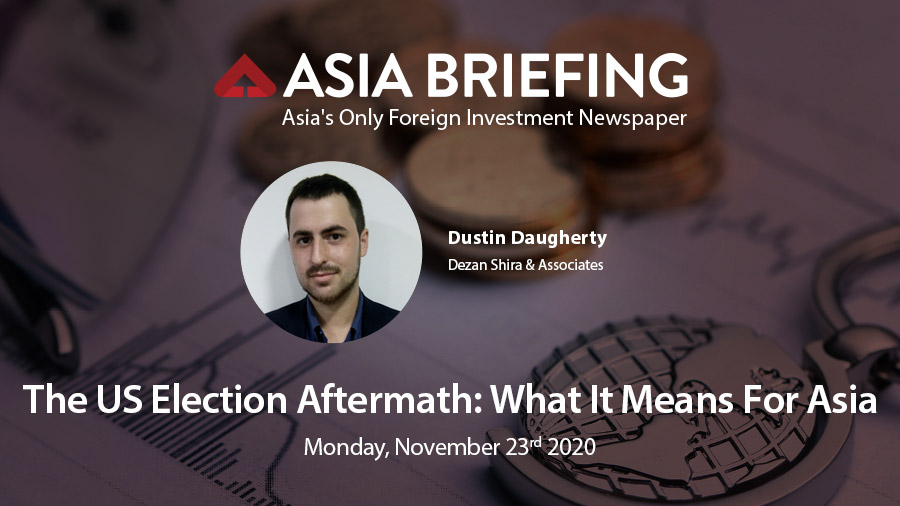Monday, November 23, 2020

By Dustin Daugherty, Dezan Shira & Associates
Dustin Daugherty is the Head of Dezan Shira & Associates United States Liaison Office and assists North American investors understand China and the markets in Asia. He then liaises with our offices in Asia to facilitate investments in Asia while remaining on US real time. Dustin is a native of New York City, where he studied Political Science and International Relations at Columbia University and is fluent in English and Mandarin. He returned to the United States several years ago to establish the firms our client liaison office there following extensive experience in Dezan Shira & Associates major offices across the Asian region, including Beijing and Shanghai in China, Hanoi and Ho Chi Minh in Vietnam and New Delhi in India.
Return to the Asia Briefing homepage
To many watchers of US politics it might look as if Washington is stuck in a kind of political purgatory. Certainly given the apparent results of the recent election the refusal of a sitting President to concede the race at this point is unusual. While the refusal so far of the federal authorities to fully recognize the results and release transition funds to the Biden transition team may impact their planning on the margins, it is far more likely than not that following the probably failure of the Trump administration’s legal efforts to dispute the election we will see a peaceful (if perhaps not as smooth as one would expect) transition of power this coming January.
In a year of crises, the US election turned out to be relatively light on policy substance and instead the electioneering was dominated by two issues – Covid-19 and the President’s personality. Given this dynamic it may appear harder than usual to divine the incoming administration’s trade policy priorities in Asia (which contrasts to even 2016 when trade played a much larger role in the election debates). Looking ahead to the Biden administration’s Asia trade policies we can however still make some forecasts and educated assumptions.
If we think back to the Obama years, which Biden obviously played a significant role in, the then called Trans-Pacific Partnership (TPP) trade agreement was a major initiative. Trump promptly pulled out of the accord upon assuming office, and I believe we can expect President-Elect Biden to attempt a reversal and join the agreement (now known as the CPTPP) once the Covid crisis settles down and the US economy shows signs of sustained recovery. Even if this does not occur, I believe we can expect to see major US efforts for bi-lateral trade engagement with emerging darlings of the US business community such as Vietnam.
Perhaps more significantly, I expect the US-India trade and investment relationship to finally start to live up to its immense potential during the Biden Presidency. While the world’s two largest democracies do have a long history of cooperation, their newly shared interests in confronting a China perceived as behaving with belligerence will in my view overcome longstanding hurdles, both politically and economically. During a time when US businesses are seeking an alternative to China, what better option can there be than a country with 1.4 billion people, low wages, a business friendly administration, and shared ideological and strategic interests? For its part, India has made strides in addressing long term concerns about efficiency and taxation held by US businesses, and I expect these efforts will bear fruit in the coming years.
Finally we must address directly the 800 pound gorilla in the room – China. The coming months may prove this belief to be foolhardy, but I strongly believe that even in the radical polarization of contemporary Washington, China has not and will not become a truly partisan issue. Many policymakers in the incoming Biden administration may feel that President Trump enacted his trade war with China for the wrong reasons, but will likewise come to a realization that he was nevertheless mostly correct in his conclusions. The calculus that supply chain dependency and exposure of strategic high technology to the PRC has been widely accepted within the intelligence and defense establishments of the US, and once that happens it is very hard to turn back.
Therefore, on China trade policy I believe we will witness a significant change in style with the upcoming Biden administration, but not a change in true policy substance. Rhetoric on both sides will cool, and superficial calm may return to the relationship. But there is no undoing what has been done. Do not expect to see an immediate resumption of phased de-escalation of the trade war, and do not expect to see any significant or immediate change in the policy on US technology being used by the titans of Chinese industry. We may even witness new plans for incentives to be offered to US firms who shift their supply chains out of the mainland. Thus, while I fully expect a more collaborative approach vis-à-vis both traditional and newly emerging US allies towards confronting China, and I certainly expect a radical change in rhetoric and style, I do not see the last four years of China trade policy being undone. And pending an unprecedented initiative and policy reversal on the side of the Chinese Communist Party, there will also be no appetite in Congress to do so.
Please feel free to reach to me for advice concerning investment strategy in Asia.
More US-China business and trade intelligence: China Briefing
Kind regards;
Dustin Daugherty
Dezan Shira & Associates
United States Liaison Office
dustin.daugherty@dezshira.com
www.dezshira.com
Disclaimer
Any views or opinions represented in this blog are personal commentary, belong solely to the contributor and do not necessarily represent the views of Asia Briefing Limited or Dezan Shira & Associates.


